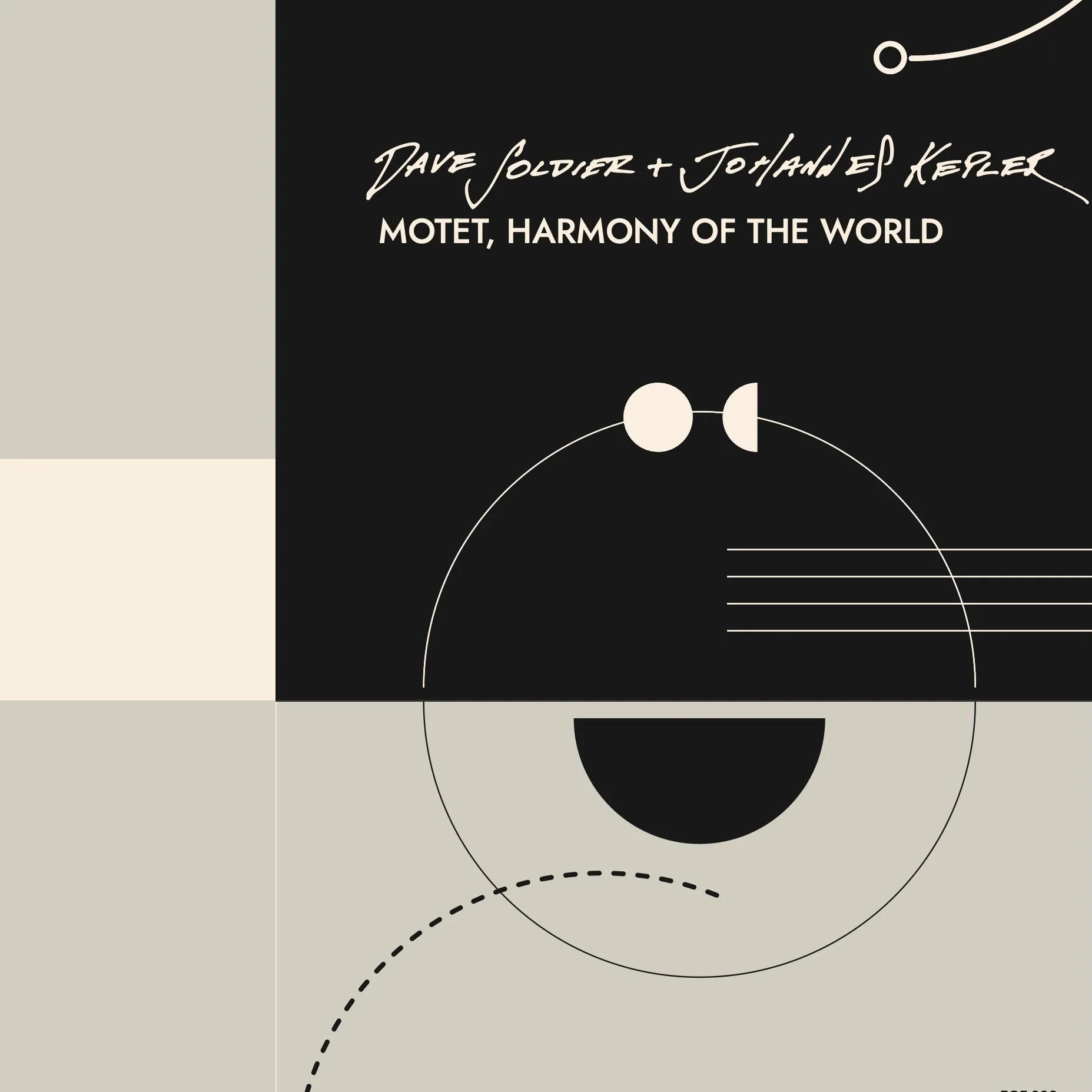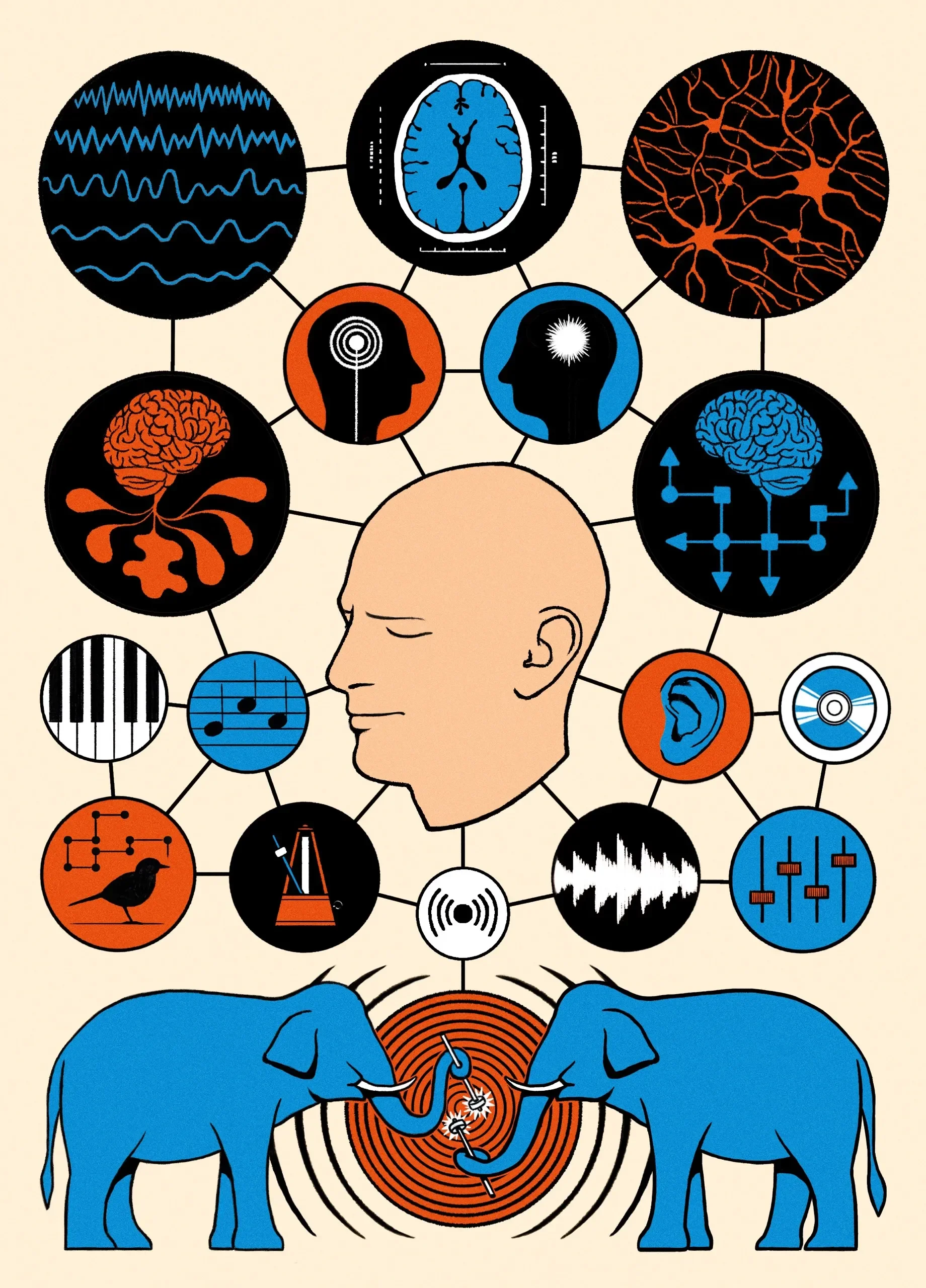“We are to think of such circles (the orbits of the planets) as like monochord strings bent round, vibrating, and study the extents to which the parts are consonant or dissonant with the whole.”
— Johannes Kepler, Harmonices Mundi, 1619
“Using a potent cocktail of math, physics, history, biology, and neurology, Dave Sulzer explains why music is the medicine most of us can’t live without.”
— Peter Gabriel, 2021
Dave Soldier + Johannes Kepler
Motet, Harmony of the World
One man is two. Both are explorers for the ages, investigators of dual hemispheres comprising a single world. David Sulzer is a neuroscientist, a Professor at Columbia University, and a leading researcher whose laboratory has made crucial contributions to studying brain mechanisms and their involvement with autism, Parkinson’s, learning, and memory. Dave Soldier is a composer and performer whose creativity supersedes genre and includes work with John Cale, David Byrne, Bo Diddley, Van Dyke Parks, Ric Ocasek, Bob Neuwirth, Kurt Vonnegut, and Guided by Voices. The duo often join to bridge music and science, including the Thai Elephant Orchestra and the Brainwave Music Project, which uses EEGs of brain activity to create compositions.
Johannes Kepler also unlocked mysteries. With the 1619 publication of Harmonices Mundi (English: Harmony of the World) he correctly reported that the planets not only revolved around the sun but did so in elliptical orbits. Within his three laws of planetary motion, Kepler fixed Copernican heliocentrism as the accurate model of the solar system. His calculations of the shapes and speeds of the rotations and the planets’ relative distances from the sun inspired Newton’s efforts to describe force, acceleration, and gravity, providing the foundation for virtually all contemporary technology and physics, from subatomic forces to understanding the universe.
Kepler considered the heavenly bodies as such—divine creations—and the mathematics of their orbits to be directly related to music. He opined that in their elliptical motion, the planets would change in musical pitch according to their distance from the sun, as a lute’s string dampened at different lengths on the neck. If this occurred, the planets would occasionally be in tune. By expecting that a “master artisan” would favor moments of consonance, Kepler deduced a scientific discovery and laid a foundation for the polyphonic music of the Renaissance. In Chapter 7 of Book V of Harmonices Mundi, Kepler requested that someday a composer write a motet based on this notion.
In 2024, Dave Soldier fulfilled that request. Consulting Kepler’s many pages and diagrams on what the motet should be, including the harmonies, allowable intervals, and scales, Soldier composed a piece of choral music, polyphonic and unaccompanied. In it, each planet is assigned a voice with a tonal limitation akin to the ellipticity of its orbit and a sequential duration relative to its distance from the sun. As these “songs” intersect, some synchronize with the rational laws of the universe as envisioned by Kepler. Others cross paths in irrational dissonances that evoke modern composition while asserting a timeless beauty. Acknowledging Kepler’s repeated references to the poet Proclus, Soldier chose his Hymn to the Sun for the lyrics. These are voiced in ancient Greek by the microtonal choir Ekmeles.
The spectacular master recording of Motet was engineered by Dražen Bošnjak, utilizing a non-proprietary audio technology of his invention. His Mach1 Spatial introduces a simple and transparent framework, a “master delivery format” for unifying multichannel and spatial audio via a vector-panning approach. In this three-dimensional environment, the “planets” rotate around the listener at speeds related to the log transformation of their orbital periods.
In 1619, Keplar exalted: “To him who more properly expresses the celestial music described in this work, Clio will give a garland, and Urania will betroth Venus, his bride.” With Motet, Harmony of the World, Dave Soldier and Johannes Kepler flow together across a 500-year expanse of discord and concord, firmament and filament, enumerating the heavens in the song.
• • • • •
Dave Soldier:
“Soldier is of two minds. As a composer and violinist, he doesn’t like to define music too strictly. He prefers to mix genres, blur categories, erase the boundaries between rock and classical, melody and noise, animal and human. He has composed string arrangements for David Byrne and John Cale, operas with Kurt Vonnegut, and cartoon scores for Sesame Street. To Soldier, it’s all of a piece. Once, in the same week, he played a gig with Pete Seeger and opened for Ornette Coleman. ‘It was like talking to the same person.’”
— The New Yorker
Soldier String Quartet:
“Like the more famous Kronos Quartet, the Soldier navigates waters outside the chamber music mainstream … But the Kronos’s unpolished performances leave one suspecting that it adopted its repertory to avoid comparison with better quartets. The Soldier seems to be the real thing — a virtuosic band given to iconoclastic experimentation.”
— New York Times
February Meets Soldier String Quartet:
“The four lengthy pieces explore the mesmerizing intersections of the two outfits via those of the blues and contemporary minimalism, the music’s steady percussion, droning strings, and repetitive guitar figures interlocking hypnotically like the inner workings of a precision pocket watch. One minute into the entrancing, Can-esque opener ‘Hate to See You Go,’ and you won’t want this disc to end.”
— Chronogram
Soldier String Quartet with John Cale:
“…it was one of those rare transcendent occasions where every audience member seemed to be experiencing the same hypnotic glow, held in sway like the tide under a powerful lunar magnetism. “
— Amazon
“The arrangements were meticulous, with the steel guitar gleaming above hymnlike piano chords and the string quartet churning out muscular chords or chamber-music counterpoint.”
— New York Times
Music, Math, and Mind
The Physics and Neuroscience of Music
(Available here from Columbia University Press)
“Every page of this book has a fascinating connection between the universal joy we find in music and some biological or mathematical fact. Only David Sulzer, a neurobiologist who is a master composer and musician, could have written this wonderful book.”
— Roald Hoffman, author and recipient of the Nobel Prize in Chemistry
“David Soldier’s excellent book turns into an encyclopedia of our tonal imagination as it catalogues the nefarious passion that gives our creativity its edge.”
— John Cale
“A ribald reality check on what makes music matter and why we should mind.”
— Van Dyke Parks
Dave Soldier + Johannes Kepler
Motet, Harmony of the World
2025
Table of the Elements
EOE-002
Read The New Yorker profile on Dave Soldier/David Sulzer here.
Illustration by Jérôme Berthier, The New Yorker, 2023
“We were sitting in the living room of his apartment in Chinatown, late at night, after one of his classes at Columbia. All around us, the desks and bookcases were covered with the tools and detritus of a working musician: keyboards and monitors, piles of sheet music and empty instrument cases. A lyre from Nairobi lay on a table in the vestibule, next to some panpipes from Vietnam, a hand-carved kettle drum, and a banjo made from old 45 records. The neuroscientist in Sulzer seemed nowhere in sight. Then he stepped over to one of the keyboards and showed me his most recent score.
“Of all his compositions, this one probably came closest to joining his two halves. It was a four-part motet based on Johannes Kepler’s ‘Harmonice Mundi’—’Harmony of the Worlds.’ First published in 1619, Kepler’s treatise was both an abstruse work of mathematics and a vision of the universe as a kind of celestial music box. Kepler worked out the planets’ elliptical paths around the sun with remarkable accuracy, then compared their motions to notes in a chord, ringing in perfect harmony. In the final book of the treatise, Kepler urged the composers of his era to set his equations to music. ‘To him who more properly expresses the celestial music described in this work,’ he wrote, ‘Clio will give a garland, and Urania will betroth Venus his bride.’
A number of composers had taken up the challenge over the centuries, Sulzer said, but they’d all fudged the mathematics. He was determined to play by the rules. Was it hard to do? I asked him. ‘Fuck yeah,’ he said. ‘But it was also kind of fun.’ In his piece, as per Kepler’s instructions, the parts of Saturn and Jupiter were sung by basses, Mars by a tenor, Earth and Venus by altos, and Mercury by a soprano. Their notes cleaved closely to Kepler’s calculations: Saturn’s part ranged from G to B and Jupiter’s from B to just above D, for instance, but Venus, with her more circular orbit, could only oscillate between E and E-flat. Kepler wanted listeners to feel as if they were standing on the surface of the sun, hearing the harmony of the spheres as the planets circled around them. The closer each planet came to the sun, the higher its notes ascended.
Sulzer opened a MIDI file on his computer and played me a passage. Its synthesized voices were a poor substitute for celestial singing, its harmonies as eccentric and stubbornly mathematical as Kepler’s theology. But later, when I heard a vocal group called Ekmeles perform the piece in a studio, I found it strangely moving. The music wasn’t luminous and ethereal, as I had expected. It was earthy and heavy-footed, full of steady, stomping forward motion. It was like an angry crowd that slowly, grudgingly joins in a folk dance. When the ethereal harmonies did come, they flashed through the music and quickly faded, like the sun’s rays at the edge of an eclipse. ‘That’s what Kepler was looking for—a moment of consonance in the universe,’ Sulzer said. ‘Usually it’s not there. But, when it is, it’s evidence that God did something right.
— Burkhard Bilger, The New Yorker, March 27, 2023





